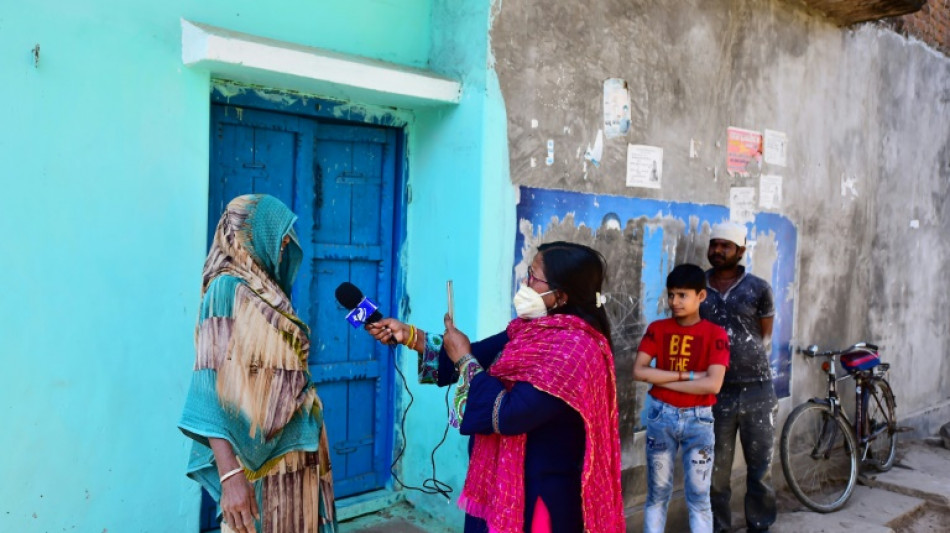
-
 Russian volcano puts on display in latest eruption
Russian volcano puts on display in latest eruption
-
Thailand uses contraceptive vaccine to limit wild elephant births

-
 Djokovic gets lucky to join Pegula, Rybakina in Melbourne semi-finals
Djokovic gets lucky to join Pegula, Rybakina in Melbourne semi-finals
-
Trump says to 'de-escalate' Minneapolis, as aide questions agents' 'protocol'

-
 'Extremely lucky' Djokovic into Melbourne semi-finals as Musetti retires
'Extremely lucky' Djokovic into Melbourne semi-finals as Musetti retires
-
'Animals in a zoo': Players back Gauff call for more privacy

-
 Starmer heads to China to defend 'pragmatic' partnership
Starmer heads to China to defend 'pragmatic' partnership
-
Uganda's Quidditch players with global dreams

-
 'Hard to survive': Kyiv's elderly shiver after Russian attacks on power and heat
'Hard to survive': Kyiv's elderly shiver after Russian attacks on power and heat
-
South Korea's ex-first lady jailed for 20 months for taking bribes

-
 Polish migrants return home to a changed country
Polish migrants return home to a changed country
-
Dutch tech giant ASML posts bumper profits, eyes bright AI future

-
 South Korea's ex-first lady jailed for 20 months for corruption
South Korea's ex-first lady jailed for 20 months for corruption
-
Minnesota congresswoman unbowed after attacked with liquid

-
 Backlash as Australia kills dingoes after backpacker death
Backlash as Australia kills dingoes after backpacker death
-
Brazil declares acai a national fruit to ward off 'biopiracy'

-
 Anisimova 'loses her mind' after Melbourne quarter-final exit
Anisimova 'loses her mind' after Melbourne quarter-final exit
-
Home hope Goggia on medal mission at Milan-Cortina Winter Olympics

-
 Omar attacked in Minneapolis after Trump vows to 'de-escalate'
Omar attacked in Minneapolis after Trump vows to 'de-escalate'
-
Pistons escape Nuggets rally, Thunder roll Pelicans

-
 Dominant Pegula sets up Australian Open semi-final against Rybakina
Dominant Pegula sets up Australian Open semi-final against Rybakina
-
'Animals in a zoo': Swiatek backs Gauff call for more privacy

-
 Japan PM's tax giveaway roils markets and worries voters
Japan PM's tax giveaway roils markets and worries voters
-
Amid Ukraine war fallout, fearful Chechen women seek escape route

-
 Rybakina surges into Melbourne semis as Djokovic takes centre stage
Rybakina surges into Melbourne semis as Djokovic takes centre stage
-
Dollar struggles to recover from losses after Trump comments

-
 Greenland blues to Delhi red carpet: EU finds solace in India
Greenland blues to Delhi red carpet: EU finds solace in India
-
Will the EU ban social media for children in 2026?

-
 Netherlands faces 'test case' climate verdict over Caribbean island
Netherlands faces 'test case' climate verdict over Caribbean island
-
Rybakina stuns Swiatek to reach Australian Open semi-finals

-
 US ouster of Maduro nightmare scenario for Kim: N. Korean ex-diplomat
US ouster of Maduro nightmare scenario for Kim: N. Korean ex-diplomat
-
Svitolina credits mental health break for reaching Melbourne semis

-
 Japan's Olympic ice icons inspire new skating generation
Japan's Olympic ice icons inspire new skating generation
-
Safe nowhere: massacre at Mexico football field sows despair

-
 North Korea to soon unveil 'next-stage' nuclear plans, Kim says
North Korea to soon unveil 'next-stage' nuclear plans, Kim says
-
French ex-senator found guilty of drugging lawmaker

-
 US Fed set to pause rate cuts as it defies Trump pressure
US Fed set to pause rate cuts as it defies Trump pressure
-
Sleeping with one eye open: Venezuelans reel from US strikes

-
 Venezuela's acting president says US unfreezing sanctioned funds
Venezuela's acting president says US unfreezing sanctioned funds
-
KPop Demon Hunters star to open Women's Asian Cup

-
 Trump warns of 'bad things' if Republicans lose midterms
Trump warns of 'bad things' if Republicans lose midterms
-
Russian strikes in Ukraine kill 12, target passenger train

-
 With Maduro gone, Venezuelan opposition figure gets back to work
With Maduro gone, Venezuelan opposition figure gets back to work
-
Celebrities call for action against US immigration raids

-
 Rubio to warn Venezuela leader of Maduro's fate if defiant
Rubio to warn Venezuela leader of Maduro's fate if defiant
-
Denver QB Nix 'predisposed' to ankle injury says coach

-
 Lula, Macron push for stronger UN to face Trump 'Board of Peace'
Lula, Macron push for stronger UN to face Trump 'Board of Peace'
-
Prass stunner helps Hoffenheim go third, Leipzig held at Pauli

-
 Swiss Meillard wins final giant slalom before Olympics
Swiss Meillard wins final giant slalom before Olympics
-
CERN chief upbeat on funding for new particle collider


Oscar spotlight shines on India's rural women journalists
An all-women team of smartphone-toting, low-caste reporters who chronicle India's hardscrabble heartland may give the cinema-mad country its first Oscar-winning film, after their own story became a critically lauded documentary.
The journalists of "Khabar Lahariya" (Waves of News) have built a huge following across Uttar Pradesh, a northern state with more people than Brazil, covering a beat that runs from cow thefts to sexual violence and corruption.
They have earned the respect of their village communities by covering local stories often overlooked by India's established media outlets, but only after a relentless battle to be taken seriously by authorities -- and even their own families.
"Just stepping outside the household was a big challenge... I had to fight many battles," reporter Geeta Devi told AFP.
"Even my father was dead against me. He said, 'You can't do this work, this is not something that women are supposed to do.'"
As with her colleagues, Devi is a member of the Dalit community, the lowest rung in India's rigid caste system and the victims of an entrenched culture of prejudice and humiliation.
In Banda, a riverside town a few hours' drive from the Taj Mahal, Devi interviewed a woman rendered destitute after she was abandoned by her husband.
But as word got around that a Khabar Lahariya reporter was nearby, others approached her to implore coverage of their own woes -- municipal neglect leading to a lack of clean drinking water and dirty, overflowing drains.
Some women took her aside to privately share their stories as victims of sexual harassment and violence -- issues often hushed up under the weight of small-town stigma.
Formal discrimination against Dalits was abolished a long time ago, but they are still often barred from entering temples or houses belonging to higher castes, and remain targets of violence.
As members of a marginalised community and women in the deeply patriarchal villages of India's Hindi-speaking heartland, Khabar Lahariya's correspondents have a unique insight into local affairs, and Devi says she is proud to be part of a team working with a "feminist lens".
- 'Women who give hope' -
Their endeavours are the subject of "Writing with Fire", an Oscar-nominated documentary that has taken the film festival circuit by storm and already won the Special Jury Award at Sundance.
The fly-on-the-wall narrative shows dedicated journalists preparing to transition from their legacy newspaper operations to digital production, unbowed by their encounters with dismissive police and fearsome local strongmen.
"It's a very inspiring story. It's a story about women who give hope," Rintu Thomas, the film's director, told AFP at an Academy Awards preview event in Los Angeles.
"I think that is very strong and powerful, especially in the world that we are in right now where there is so much mistrust of the media," she added.
India is home to the world's most prolific film industry and cinema holds a rarefied place in national culture, with stars enjoying almost divine status and people often queuing to watch the same movie multiple times.
But no Indian-produced film or documentary has ever won an Academy Award, despite locally shot foreign productions "Gandhi" and "Slumdog Millionaire" each winning Best Picture in years past.
- 'We can achieve anything' -
Parts of India have prospered in the three decades since market reforms brought a jolting end to decades of sclerotic, socialist-inspired central planning.
Khabar Lahariya works in areas left behind by the economic boom, where life has barely changed even as new wealth transforms the country's urban landscape and culture.
Meera Devi, the outlet's managing editor, says her work is driven by a passion for giving a voice to those left out of India's success story.
"When I fight for the rights of the minorities, tribals and other marginalised sections of society -- when these people get heard and get justice, I feel very good," she said.
Born in a remote village and married at 14, Meera had to fight against the odds to get a college degree.
The 35-year-old joined the media house in 2006, soon after it began publishing, initially working on stories of cattle theft and tragic family disputes before moving on to local politics.
Her work has sent crooks to jail and shamed officials into ordering the repair of rundown roads, as well as charting the rising tide of Hindu nationalism in the country's rural hinterlands.
"The men here are not used to seeing powerful women, especially in a field like journalism. But we are changing that outlook," she said.
"We have proved that if women are given the right opportunities, we can achieve anything. Once you give women the freedom they deserve, you simply cannot stop them."
R.Adler--BTB




